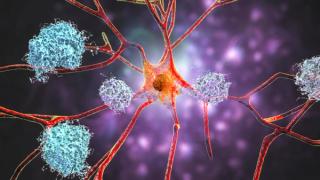
Brain Health
Latest News
Latest Videos

CME Content
More News

Paula E. Voinescu, PhD, MD, emphasized the need for additional research in this area, noting it is both “surprising and upsetting.”

In clinical trials, the dihydroergotamine (DHE) nasal powder had favorable safety profiles and rapid pain relief in patients with migraine with or without aura.

Nipocalimab the first and only FcRn blocker approved in anti-acetylcholine receptor– or anti-muscle-specific kinase adults and children with generalized myasthenia gravis.

Logan Schneider, MD, explains the latest findings on narcolepsy and idiopathic hypersomnia treatments, highlighting patient experiences and sleep architecture improvements.

The breakthrough designation is supported by clinical data from ongoing phase 1/2 trials.

The safety profile of diazepam nasal spray among pediatric patients was consistent with older patients, supporting its use in this age group.

Nipocalimab with standard of care helped patients with generalized myasthenia gravis (gMG) maintain improvements in daily living and quantitative scores compared with placebo.

The future holds the promise of earlier diagnosis, more targeted therapies, and personalized neurological care, said speaker William D. Freeman, MD, FAAN.

Huntington disease (HD) has no curative treatments, therefore, there is a great need for therapies that can reduce or slow the progression of symptoms.

Nilufer Ertekin-Taner contrasts current one-size-fits-all Alzheimer disease treatments with the promise of precision medicine and emphasizes the vital role of collaborative, multidisciplinary care.

The HERCULES trial demonstrates tolebrutinib's potential to slow disability progression in non-relapsing secondary progressive multiple sclerosis, offering a new treatment option for patients with limited therapeutic choices.

Numerical differences were observed as early as Month 1.

Advanced practice provider (APP) care models allow for health systems to better individualize care for patients, effectively meeting their needs.

Kayla Johnson, PharmD, BCPS, BCPP, highlights how integrating pharmacists into neurology clinics drives significant cost savings, high intervention acceptance rates, and improved care coordination.

Stephanie Miller, PhD discusses how artificial intelligence can revolutionize medical research by assisting in drug development and potentially providing more targeted treatments across various diseases.

Glucagon-like peptide-1 (GLP-1) analogs demonstrate potential to address multiple pathological processes in Alzheimer disease, with promising early research suggesting cognitive improvements and potential for future treatment.

Andrew Charles, MD, outlines why calcitonin-gene-related peptide (CGRP) antagonists are increasingly favored as first-line migraine treatments and how pharmacists play a key role in patient education and support.

A study led by Kayla Johnson, PharmD, BCPS, BCPP found that integrating specialty pharmacists into non-multiple sclerosis (MS) neurology clinics led to significantly enhanced patient care and treatment outcomes.

Beth A. Malow, MD, MS, FAAN, said that pharmacists and health care professionals are at the frontlines of collaborating and raising awareness of climate change’s impacts.

Malow also emphasized the importance of staying educated on the potential neurological risks that may occur as a result of climate change.

Nilufer Ertekin-Taner outlines how embracing the biological complexity of neurodegenerative diseases can guide the development of precision therapies akin to those used in oncology.

BIIB080 is designed to target microtubule-associated protein tau mRNA, aimed to reduce the production of tau protein.

Reducing stigma, improving mental health benefits, and addressing workload concerns all need to happen simultaneously.

About 59.2% of patients with tardive dyskinesia (TD) who completed the 48-week trial achieved remission.

Patients with a disorder from this family of neurodevelopmental conditions face a lack of approved treatment options, making radiprodil poised to transform the treatment paradigm.



































